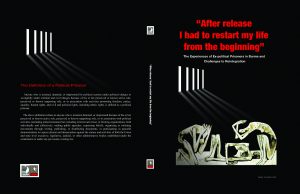Political Prisoners Need Not Be Forgotten
By Burma Partnership • June 1, 2016 On 25 May, 2016, the Assistance Association for Political Prisoners (AAPP) and the Former Political Prisoners Society (FPPS) released a joint-report entitled “‘After release I had to restart my life from the beginning’: The experiences of ex-political prisoners in Burma and challenges to reintegration.” Based on information provided by 1,621 former political prisoners, the report exposes the mistreatment and abuse – including the use of torture – that has proliferated Burma’s prison system.
On 25 May, 2016, the Assistance Association for Political Prisoners (AAPP) and the Former Political Prisoners Society (FPPS) released a joint-report entitled “‘After release I had to restart my life from the beginning’: The experiences of ex-political prisoners in Burma and challenges to reintegration.” Based on information provided by 1,621 former political prisoners, the report exposes the mistreatment and abuse – including the use of torture – that has proliferated Burma’s prison system.
AAPP and FPPS illuminate how Burma’s judicial system has been consistently used to silence political dissidents, including through draconian and oppressive legislation such as the Emergency Provisions Act (1950) and the Unlawful Associations Act (1908). Further, the report documents the widespread use of torture – which runs counter to customary international law, as evidenced in legal instruments such as the Universal Declaration of Human Rights – as a means of interrogating, humiliating and degrading political prisoners. Forcing prisoners into uncomfortable stress positions for extended periods of time, the “Iron Road” tactic of “rolling an iron bar or bamboo rod up and down the shins with increasing pressure until the detainee’s skin peels off,” and attacks on a prisoner’s psychological state through sleep or sensory deprivation constitute only a small portion of the extensive portfolio of torture methods used against political prisoners. Torture was not the only form of abuse; political prisoners were also subjected to poor sanitation and physical conditions inside prisons, inadequate access to food, water and healthcare, and in certain cases, sentenced to hard labor or solitary confinement as a punishment.
The suffering faced by political prisoners during their incarceration continues even after their release. According to the report, case studies involving forced exile, travel restrictions and limited educational and employment opportunities are only a few of the barriers to full reintegration for former political prisoners. In addition, reparation programs have yet to be organized by the Burma Government, leaving the void to be filled by civil society organizations such as AAPP or the U Win Tin Foundation.
Recent reports on the mistreatment of detained student activists and their supporters from the 2015 Letpadan protests, including the denial of medical care and beatings, is a grim reminder of the need to address Burma’s policy of detention for political prisoners and the conditions of its prison system. Despite an earlier promise from former President Thein Sein that all political prisoners would be released by the end of 2013, the rate of detained political activists was observed increasing as recent as January 2016. This led Phil Robertson, deputy Asia director of Human Rights Watch to state that, “Burma’s growing number of political prisoners is the most glaring indictment of President Thein Sein’s human rights record.”
While the current National League for Democracy (NLD)-led Government has promised to cease imprisoning political activists, there is still significant room for improvement. Immediately after formally stepping into office, the NLD-led Government released 113 political prisoners, including 69 students who were involved in the March 2015 education protests. However, political activists continue to be detained and sentenced on arbitrary charges. In recent news, factory workers were arrested for protesting labor rights as they marched towards Naypyidaw. Similarly, Maung Saung Kha was recently sentenced to six months in jail (though he will walk free as a result of having served his time in prison prior to the sentencing) for having released a poem defaming former President Thein Sein. According to AAPP, there are still 64 political prisoners behind bars and another 174 awaiting trial.
Echoing the first recommendation from AAPP and FPPS’s report, the new NLD-led Government must recognize political prisoners as such and release them without hesitation. Committing to a democratic reform of government means that democratic principles – namely freedom of expression and assembly – are respected. Individuals arrested on baseless, politically motivated and oppressive charges for demonstrating their right to speak out or criticizing the government must be protected. The NLD-led Government should therefore heed the criticism observed by AAPP and FPPS and release all remaining political prisoners and drop charges against those awaiting trial without further ado. In addition, the NLD-led Government should immediately amend or appeal all oppressive laws, ratify the United Nations Convention against Torture and implement prison reform in compliance with international human rights standards.
Tags: Assistance Association for Political Prisoners, Former Political Prisoners Society, National League for Democracy, Political Prisoners, Torture, United Nations Convention Against TortureThis post is in: Blog
Related Posts“Prison Conditions in Burma and The Potential for Prison Reform” Report
AAPP launches report entitled ‘Prison Conditions in Burma and the Potential for Prison Reform’
Assistance Association for Political Prisoners-Burma’s Statement
Report on the human rights situation in Burma (January – June, 2016)
Statement – Assistance Association for Political Prisoners (Burma): Month in Review (July 2016)









 All posts
All posts